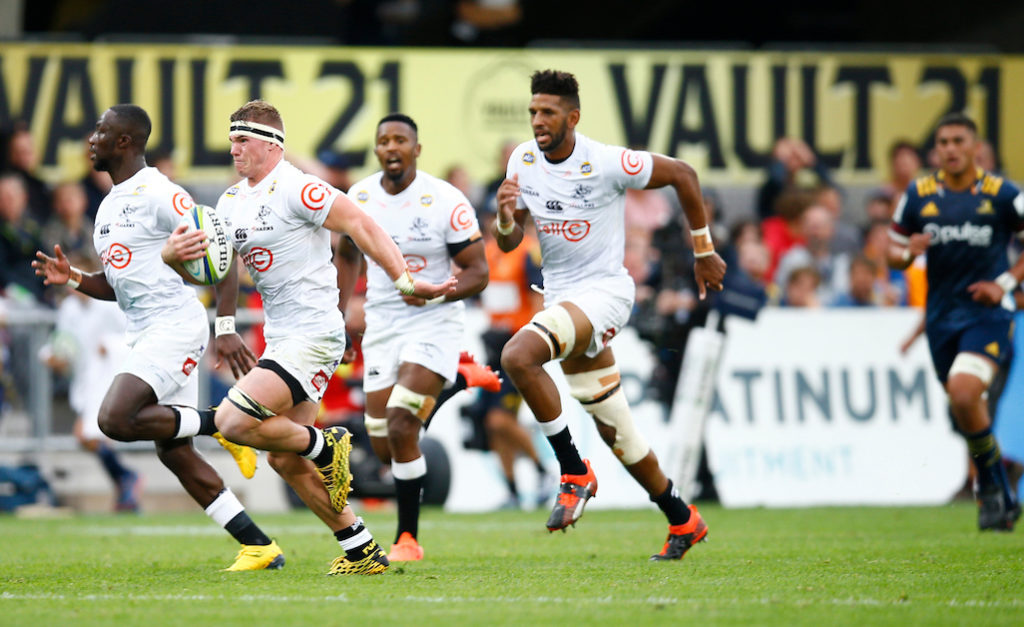It’s too early in Vodacom Super Rugby to speak of a Sharks renaissance but the positive signs are there that the Shark Tank is stirring into life, writes Durban-based veteran journalist MIKE GREENAWAY.
Consistency in performances — that perennial achilles heel of the Sharks — will tell us more over the coming weeks but I am optimistic that they have the right ingredients this year under CFO Eduard Coetzee and coach Sean Everitt to manufacture something special.
I say this because the emphatic win over the Highlanders was the materialisation of everything the Sharks have been planning in a marathon off-season that began as long ago as October last year.
In a nutshell, what we saw against the Highlanders was Everitt’s identification of how the Sharks should play according to the latest trends in modern rugby, and the implementation of a significant part of that plan by players the Sharks went out and bought with an eye on how they want to play.
The way Everitt sees it, most tries in the modern game come from turnover ball because defences are unstructured against a sudden counter-attack. In phase play, and obviously from set pieces, defences have time to reset.
Further, if you are going to thrive on precious turnover ball, you have to have a plan to go out and get it, which is why the Sharks have changed their whole approach to breakdown play.
They had tended to fan out on defence, not committing numbers to the breakdown, but in the off-season the major focus was to turn that on its head and attack the breakdown ferociously.
Everitt brought in Springbok coach Jacques Nienaber to assist in changing the way the Sharks defend. Against both the Bulls and Highlanders we saw savage rucking and counter-rucking from the Sharks and rapid rush defence from their backs, with the latter snuffing out the Highlanders’ ambition to successfully play with width.
READ: SA Player of the Week (Round 2)
A vital component of the Everitt approach is a genuine openside flank. The Sharks have not had one for ages. Marcell Coetzee, some years ago under John Plumtree, is the closest they have had to a fetcher, and there was certainly no such animal under Jake White and Robert du Preez, when the Sharks opted for three burly ball-carriers as a loose trio.
That is why Coetzee went shopping for an opensider and brought James Venter back home to his native Durban as well as Henco Venter from the Cheetahs.
James Venter, a product of Glenwood High in Durban, went to the Lions after school only for them to let him go, which is strange given how good he was in last year’s Currie Cup final, and he has been sensational in his role at the Sharks this year.
Also vital to how Everitt wants to play is a skilled link man between backs and forwards, and Coetzee thus secured Sikhumbuzo Notshe from the Stormers.
It was illustrative of what the Sharks are trying to do this year when Notshe and Venter combined slickly from turnover ball for Venter’s try against the Highlanders.
The Sharks’ other four tries, two each for Makazole Mapimpi and Aphelele Fassi, came from turnovers as the Sharks gave the Kiwis a lesson in counter-attacking rugby, something which has long been the preserve of New Zealand teams.
I feel that the Sharks under Du Preez had an identity crisis as to how they should play and that explains why they were so inconsistent. They didn’t seem to know whether they should play to the strengths of their physical pack, backed up by a kicking game, or to exploit their dangerous backs, most of whom are now under Everitt.
In 2020, the Sharks have a definitive game plan that suits the players they have at their disposal and has their buy-in. It is early days but the Sharks are already looking like a settled, confident team that is only going to grow stronger.
Photo: Steve Haag Sports/Hollywoodbets






